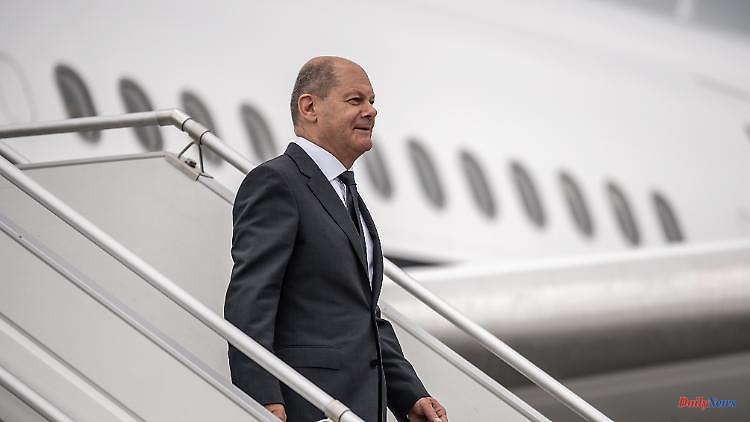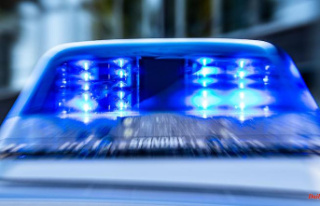With every week of war and every hesitation on the part of the chancellor, expectations of his late trip to Kyiv grow. No date has been set yet, but he would have to have two things in his luggage to give weight to a visit: a vote on Ukraine's EU accession and clear deadlines for arms deliveries.
When are you going to Kyiv, Chancellor? Olaf Scholz has heard this question in different versions countless times in recent weeks. And he always reacted tight-lipped, sometimes even in a really bad mood. This was also the case on Saturday, when a journalist asked him about his plans for Kyiv in the Bulgarian capital Sofia at the end of his visit to the Balkans. This time, the occasion is current trips to Ukraine by the President of the European Commission, Ursula von der Leyen, and the Federal Ministers, Karl Lauterbach and Cem Özdemir.
"I welcome all of these trips. Unlike you, I didn't come across them as a surprise, but were aware of them beforehand," replies the Chancellor. "They all make sense, and that's always the benchmark for every trip." He says nothing again about a possible trip of his own. No wonder, because even if you have such a plan, as the head of government of the most populous and economically strongest Western European country, you usually do not reveal it, so as not to jeopardize the trip. After all, it's war in Ukraine.
Shortly after landing in Berlin, however, the "Bild am Sonntag" spread the message that Scholz would travel to Kyiv this month - without naming a specific date. Together with French President Emmanuel Macron and Italian Prime Minister Mario Draghi, he will visit Ukrainian President Volodymyr Zelenskyj before the G7 summit in Elmau, Bavaria, which begins on June 26. The newspaper refers to French and Ukrainian government circles. There was no official confirmation of this, but no denial either.
Since the Russian war of aggression began at the end of February, numerous heads of state and government have traveled to Kyiv to demonstrate their solidarity with Ukraine in its defensive struggle against Russia. The wave of travel was launched in mid-March by three Eastern European heads of government, who made their way from southern Poland to the Ukrainian capital in a special train. The airspace over Ukraine is closed because of the war. The train journey from the border takes about 12 to 13 hours. Numerous other heads of state and government followed, speakers of parliament, even ministers of agriculture, health and culture. Even the 71-year-old US First Lady, Jill Biden, made the arduous journey to stand with Ukraine. Irish pop icons U2 played a solidarity concert in a subway station that was used as an air raid shelter.
Only with Scholz was the issue of the trip to Kyiv messed up from the start. First he pointed out that shortly before the start of the war he had been to Zelensky for an inaugural visit. Then there was the scandal surrounding Federal President Frank-Walter Steinmeier, who wanted to go to Kyiv but was not welcomed by the Ukrainian side when he was already on his way. After these irritations had been cleared up, Scholz let Foreign Minister Annalena Baerbock go first and then said: "I will not join a group of people who do something for a short in and out with a photo shoot. But if, then it's always about very specific things."
Now there is this "very concrete thing" and it could even become a historic event: In the next two weeks it should be decided whether Ukraine will become a candidate for accession to the European Union. The EU Commission is expected to make its recommendation on this next Friday. The following week, the 27 heads of state and government of the EU deal with it. Von der Leyen speaks of a "historic decision". In order to make final preparations, she was in Kyiv on Saturday for the second time since the beginning of the war.
Confidential details of Ukraine's path to the EU are better discussed in person than over the phone. Even after her meeting with Selenskyj, von der Leyen has not yet revealed whether her authority will say yes to candidate status. But your words on the way back point in this direction. "I hope that in 20 years, when we look back, we can say that we did the right thing." Scholz and Macron, who play the central roles at the summit in Brussels, should also be aware of the challenge of doing the right thing. You haven't positioned yourself yet. A trip to Kyiv would offer the right stage for this.
With his characteristic openness, the Ukrainian Ambassador Andriy Melnyk also formulated Kiev's expectations of the planned Scholz trip. "We hope that during his visit to Kyiv the chancellor will finally keep the German promises regarding arms deliveries and Ukraine's accession to the EU," Melnyk told Der Spiegel. According to Melnyk, the delivery of heavy weapons such as the "Panzerhaubitze2000" and the "Gepard" anti-aircraft tank is still awaited to this day. "Announcements alone won't help us in the war against the invaders, which is why we're hoping for concrete dates from the chancellor as to when the weapons will arrive," said the ambassador, "especially since the promises were made months ago."
Melnyk is also hoping for progress when it comes to EU accession. "If the German Chancellor, together with the heads of government from Paris and Rome, sends a signal that Ukraine can become a candidate for accession, that would be more than just a strong symbol," said Melnyk, "it would strengthen the Ukrainians' morale and clearly strengthen Russia show that the EU is firmly committed to a free Ukraine." Melnyk recalled that Chancellor Scholz had always said that he did not want to travel to Kyiv just for a photo shoot. The Ukrainian government therefore hopes that Scholz has a lot of concrete things to bring and not just warm words.
According to "Spiegel", the FDP defense politician Marie-Agnes Strack-Zimmermann made a very similar statement. It is good that the chancellor is traveling to Kyiv, she said, but added: "It will be exciting to see what promises he brings to the Ukrainian president. Either way, he must now deliver in the truest sense of the word."












